calsfoundation@cals.org
Denning (Franklin County)
| Latitude and Longitude: | 35°25’45″N 093°45’26″W |
| Elevation: | 449 feet |
| Area: | 1.08 square miles (2020 Census) |
| Population: | 200 (2020 Census) |
| Incorporation Date: | December 2, 1903 |
Historical Population as per the U.S. Census:
|
1810 |
1820 |
1830 |
1840 |
1850 |
1860 |
1870 |
1880 |
1890 |
1900 |
|
– |
– |
– |
– |
– |
– |
– |
– |
– |
– |
|
1910 |
1920 |
1930 |
1940 |
1950 |
1960 |
1970 |
1980 |
1990 |
2000 |
|
757 |
608 |
384 |
341 |
268 |
227 |
203 |
238 |
206 |
270 |
|
2010 |
2020 |
|
|
|
|
|
|
|
|
|
314 |
200 |
|
|
|
|
|
|
|
|
Denning is a town in southern Franklin County. Its northern border is the southern city limit of Altus (Franklin County). Denning was at one time the largest city in Franklin County, with six coal mines providing jobs for more than 1,000 miners.
Osage used to come from the north to hunt and to fish in the Ozark Mountains. From 1819 to 1828, the area was part of a Cherokee reservation. Various treaties moved both nations farther west, opening the land to white settlement. In 1839, Samuel Davis acquired a land patent for part of the land where Denning would be established.
Coal was discovered south of Altus around 1890, and the Western Coal and Mining Company, based in St. Louis, Missouri, began purchasing land for coal mining. Benjamin Denning came to Altus to establish the company’s presence, and ground was broken for the first coal mine shaft in December 1893. At the company’s peak, six mines operated, and a large community arose around the mines. When a post office was established in 1894, it was named for Denning.
The town, which was incorporated in 1905, had seventy-seven houses, as well as a general store, a post office, a schoolhouse, and a railroad depot, served by the Missouri Pacific Railroad. The mining company provided the houses for its workers and their families and owned the general store. The town also had a bank, a blacksmith shop, dance halls, saloons, gambling establishments, and four churches. Two structures were built of native stone. One was a prison, and the other was a vault for storing gold coins used to pay the miners.
At first, the mines were non-union. In 1899, the miners carried out a strike, demanding higher wages, shorter hours, and better working conditions. The strike was not resolved until 1903, at which time the miners won the right to unionize.
By 1915, the first of the company’s six mines had been worked out, and production was diminishing in the other mines as well. A large fire destroyed part of the town in 1922. The last mine closed in 1947, as the population of Denning was diminishing. By 1953, the railroad depot was closed, and the town had one general store and the post office. The school had consolidated into the Altus School District. According to a 1978 publication, at that time, Denning was notable as one of three municipalities in the United States whose entire town government consisted of women.
The post office was closed in 1965. By 1973, Denning was being described as a ghost town. The abandoned store and stone jail still stood, but the population had dropped to fewer than 100. After this time, new houses began to be built in Denning for people who worked in Altus. The Altus-Denning School District was closed in 2004, and students were enrolled in the Ozark School District.
A tornado devastated Denning shortly after midnight on May 25, 2011, killing four people. The Methodist church was destroyed, as well as many homes, although some were later rebuilt.
For additional information:
Opper, Ken. “Past Haunts Denning Today.” Arkansas Gazette, June 24, 1973, p. 5E.
Owens, J. J. “Denning Basks in Glory of Its Early Days.” Arkansas Democrat Sunday Magazine, March 1, 1953, p. 3.
Powell, Norman. “Denning, Arkansas, Boom Town in Franklin County.” Franklin County Observer 2 (March 1978). Online at http://www.rootsweb.ancestry.com/~arfrankl/Town/Denning/denning.htm (accessed May 18, 2022).
Shropshire, Lola. Franklin County. Charleston, SC: Arcadia Publishing, 2000.
Steven Teske
Butler Center for Arkansas Studies
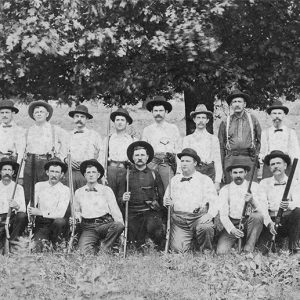 Coal Mine Guards
Coal Mine Guards 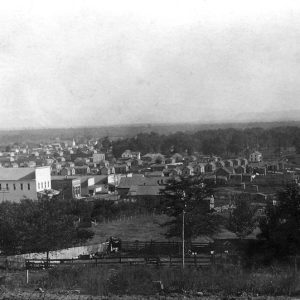 Denning
Denning 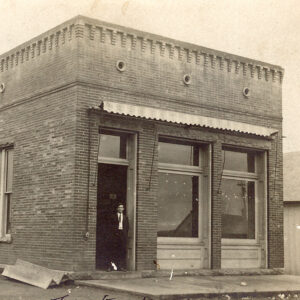 Denning Bank
Denning Bank 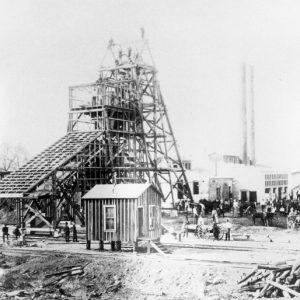 Denning Coal Mine
Denning Coal Mine 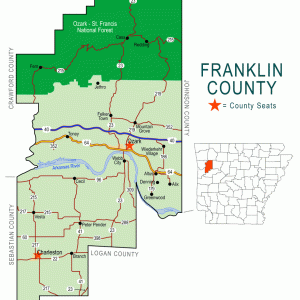 Franklin County Map
Franklin County Map 




I served as mayor of Denning for three years before moving to Russellville. My father, Herman R. McCormick, served as mayor off and on for fourteen years. He was able to invest the town’s funds and eventually was able to pay off the water system. Denning still owns Denning Water. The town of Denning is run by a mayor and city council government. The Town Council building and a separate activities center/storm shelter were built after the tornado. The center is named for longtime council member Juanita Burns.
My father is 89 and still lives in Denning, as does my sister, Donna Thomas, who is on the town council. I have pictures of the destruction of the tornado. I also have clippings from advertisements for the Denning when it was a coal boom town. These were to attract people into settling in the town.